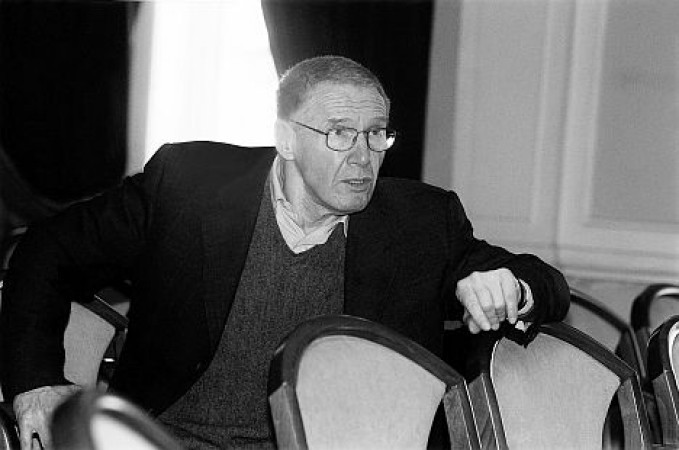
19 February 1926, Lugos
In recent decades György Kurtág has been the most internationally successful Hungarian composer. He was also a professor, held in especially great esteem, of the Chamber Music Department of the Music Academy for almost thirty years. During this time his classes were visited by students and graduate artists alike. Singers and instrumentalists asked for his advice; his legendary sessions in room XXIII were always attended by numerous admiring visiting students. Thus, his influence goes much beyond the circle of his immediate pupils: a great many Hungarian musicians claim him today as their master.
Kurtág was born in Lugos, in Romania, in 1926. He began his musical studies in Temesvár in 1940, learning the piano from the Bartók-pupil Magda Kardos, and composition from Max Eisikovits. Following the Second World War, he moved to Budapest and entered the Music Academy in 1945. He studied the piano with Pál Kadosa till 1951; his composition teachers were Sándor Veress (1946-49) and Ferenc Farkas (1949-55). During the same time he also gained a diploma in the chamber music department, studying with Leo Weiner. It was at Weiner's classes that he learned the relentlessly consistent approach to the coaching of performing artists, whose absorption and further development led to Kurtág's unique reputation as a coach. In the lively atmosphere of the Music Academy at the end of the nineteen-forties, he had also other important influences: Zoltán Kodály's lectures on folk music, participation in the choir led by Jenő Ádám, and especially Bence Szabolcsi's classes on music history, where he was present when Ernő Lendvai gave his first Bartók analyses. Among his fellow students, György Ligeti held a particularly important place: after their first meeting Kurtág immediately chose him as his "spiritual mentor".
His career as a composer broke off after the Viola Concerto, which had its premiere in 1954, and only resumed after his stay in Paris during 1957-58, following his sessions there with Marianne Stein, a psychologist specialising in artists. The opening act of his new style was the String Quartet, which he completed in 1959, in which he formed, without compromises, his modern and at the same time irrepressibly personal musical language. For several decades, faithful to this concise chamber music sound, he has explored the anguished feelings of twentieth century man, with a deeply moving lyricism that combines the traditions of universal music history and Hungarian music. He has been awarded a great many prizes in the course of his career: besides the Kossuth Prize (1973, 1996) and the Béla Bartók-Ditta Pásztory Prize (1984), he received the Herder Prize (1993), the Feltrinelli Prize (1993), the Austrian State Award (1994) and the Siemens Prize (1998). He is a member of several academies and his works are played at the most prestigious European festivals (Berlin, Salzburg, Edinburgh, Avignon, Paris, etc.).
His work as a teacher acts almost as a counterpoint to his activities as a composer. Between 1960 and 1968 he worked as a coach for the National Philharmonic; in 1967 he was appointed a teacher at the Music Academy. First he taught piano as Kadosa's assistant, later moved to the Chamber Music Department. In this illustrious period in the Department's existence, besides András Mihály and Ferenc Rados, Kurtág also represented in an individual manner the traditions of Hungarian chamber music teaching. Just as in his compositions, in teaching too, he is characterised by an extreme exactingness; the joint work with the pupil is directed primarily at developing the personal authenticity of the music-making, the spiritual disposition of the performer. One of his violinist pupils recalled the process lasting six months in the course of which they covered just the exposition of a movement of a Mozart sonata: "Kurtág is searching for a super-ideal, which in reality is unrealisable. Every musician must endeavour to approach this perfection, even if he knows that the goal will always be unattainable for him." László Dobszay's characterisation of the composer is also true as regards the coach: "He relates to the sounds with a curious and searching passion. In reality it is the individual sound that he researches. Let us think of someone who would like to know every country: a hopeless undertaking. But let us imagine someone for whom the country's reality is too big and impersonal: he wants to shake hands with every person individually. That is how Kurtág wants to discover the sensation of every sound and make it his possession."
He asked to retire in 1986, but kept having regular sessions with a few selected chamber music groups till 1993. When, from the 1980's onwards, his fame as a composer made him internationally known, he had invitations from many places to lead chamber music courses. From 1985 he taught at the Szombathely Bartók Seminar, led a master course at the Bern Music Academy, also at the Marlborough Festival. In 1993-94 he worked as a couch at the Vienna Konzerthaus, in1994-96 at the Hague Conservatoire, and from the autumn in 1999 at the Paris Conservatoire.
P. H.


